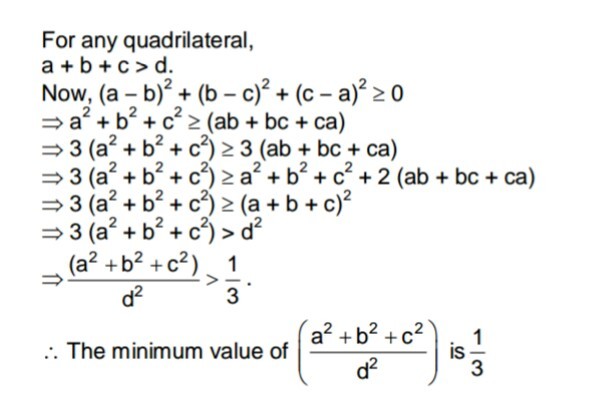This section requires Javascript.
You are seeing this because something didn't load right. We suggest you, (a) try
refreshing the page, (b) enabling javascript if it is disabled on your browser and,
finally, (c)
loading the
non-javascript version of this page
. We're sorry about the hassle.
2 solutions
Thank you very much... Fixed it..
@Ankit Kumar Jain nice solution (+1)....
Since 3 1 cannot be attained therefore , it is not the minimum value rather it is the infimum value.
Log in to reply
I have fixed it now... Thanks :)
Log in to reply
See my solution above.
There will be no equality sign.
As the property of a quadrilateral used here is a strict inequality.
Find the infimum value of d 2 a 2 + b 2 + c 2 where a , b , c , d are the sides of a quadrilateral.
Let the value be k . Enter your answer as 6 k
You can copy this down to edit the problem. @Rahil Sehgal
@Rahil Sehgal Edit your solution bro...!

By Titu's Lemma ,
( 1 + 1 + 1 ) ( a 2 + b 2 + c 2 ) ≥ ( a + b + c ) 2
⇒ a 2 + b 2 + c 2 ≥ 3 ( a + b + c ) 2
⇒ d 2 a 2 + b 2 + c 2 ≥ 3 d 2 ( a + b + c ) 2 ⋯ ( 1 )
Consider a quadrilateral A B C D .
In △ A B D , A B + A D > B D
In △ B C D , B D + C D > B C
Adding the two gives A B + A D + C D > B C
This leads to the conclusion that sum of three sides in any quadrilateral is greater than the fourth side.
Following this , we have a + b + c > d ⇒ ( a + b + c ) 2 > d 2 ⇒ d 2 ( a + b + c ) 2 > 1 ⋯ ( 2 )
By ( 1 ) , ( 2 ) ,
d 2 ( a 2 + b 2 + c 2 ) > 3 1
NOTE:
3 1 is the infimum value and not the minimum value as this value cannot be attained.